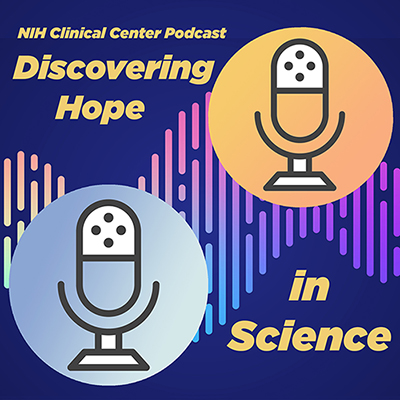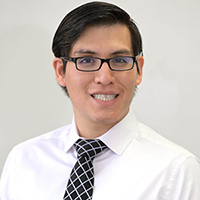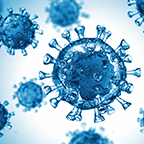In this episode, we sit down with Dr. Julio Huapaya, a Senior Critical Care Fellow in the Clinical Center's Critical Care Medicine Department, to discuss his published journal article. We review the importance of his findings and implications to the public health. In this study, researchers evaluated patients who had been vaccinated against SARS-CoV-2 and had breakthrough infections and compared them to unvaccinated patients infected with SARS-CoV-2. The study showed that vaccinations may help limit the progression of inflammatory responses associated with disease severity.
[Background Music]
DR. JULIO HUAPAYA: It is important to highlight that the majority of these patients we studied had infections from the early variants like Wuhan and Delta. One of the findings in our study was that patients who were not vaccinated and were infected, still had evidence of immune activation. Vaccinations are key to preventing serious infection.
[Background Music]
JANICE DURAN: From the National Institutes of Health clinical Center, this is discovering discovering, discovering hope in science.
DURAN: My name is Janice from the Office of Communications and Media Relations and I'll be your host. In today's episode we are going to talk about the article Vaccination Ameliorates Cellular Inflammatory Responses and SARS COVID 2 breakthrough infections published in The Journal of Infectious Diseases and I'm very excited to have the first author Dr. Julio Huapaya here with us today. Dr. Huapaya is a senior Critical Care fellow at the National Institutes of Health Critical Care Medicine Department. He is also an associate investigator for the cardiopulmonary inflammation and multi-system imaging in the COVID 19 study group. Hello and welcome Dr. Huapaya.
HUAPAYA: Hi Janice, thank you for the invite. It's a pleasure to be here.
DURAN: Thank you for being here with us. You've been leading the effort for studying the immune response of patients who are diagnosed with COVID and had breakthrough infections. Why is this research and finding important and how will it impact the health of Americans?
HUAPAYA: Our research shows how important vaccination is in preventing serious illness due to SARS COVID 2. Our group studied the cells that are involved in the response of the body to natural infection and compare them to persons who were fully vaccinated and then had breakthrough infections. We divided our patients into those who were not vaccinated with mild, moderate and severe infection based on whether they were hospitalized and if so how much extra oxygen they needed. Of note, none of the vaccinated patients were hospitalized or require oxygen. It is important to highlight that the majority of these patients we studied had infections from the early variants like Wuhan and Delta and not the most recent Omicron variant which appears to be less toxic overall. As mentioned previously we studied the different types of cells in the blood that play a key role in controlling the SARS COVID 2 virus. We found that vaccinated patients are able to control damage from the virus by putting a break on the escalating inflammation that develops after COVID infection so it doesn't progress to serious illness. In summary, while vaccination alone does not prevent infection, it has prepared the body's immune system to be able to limit the illness that results from the infection.
DURAN: Do you think there could be a relationship between those findings and long COVID?
HUAPAYA: That's an excellent and complex question. The quick answer is we don't know. The current thinking is that there could be reservoirs of virus in the body that are not replicating but are still causing low levels of inflammation. One of the findings in our study, was that patients who were not vaccinated and were infected, still had evidence of immune activation several months after the onset of their infection. In contrast the vaccinated patients with breakthrough infections had a shorter duration of these immune activation. However, whether this more sustained immune activation has a relationship to the symptoms of long COVID, it's still under investigation.
DURAN: If you had one thing you'd like the public to know from your research what would that be?
HUAPAYA: At this point although we don't know what risk of the future waves of different viral variants will be and how risky they will be for the health of the public. Vaccinations, especially in high-risk persons such as those with chronic heart or lung diseases or immune system abnormalities are key to preventing serious infection.
DURAN: We're heading towards the end of our podcast. Is there anything else you'd like to add?
HUAPAYA: I would like to take 30 seconds to thank the outstanding group of researchers and collaborators who have supported this research including: NIAID, NHLBI, NINDS and the Medstar Washington Hospital Center; as well as the study nurses with the COVIDR study group, to the patients who volunteered to be part of our study and to Dr. Anthony Suffridini who is a principal investigator and mentored the group throughout.
DURAN: Thank you so much for joining us today Dr. Huapaya and discussing your research with us. Thanks for listening to Discovering Hope in Scienc. View more episodes.




